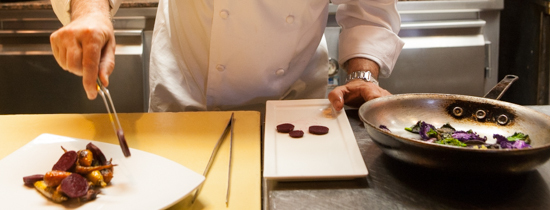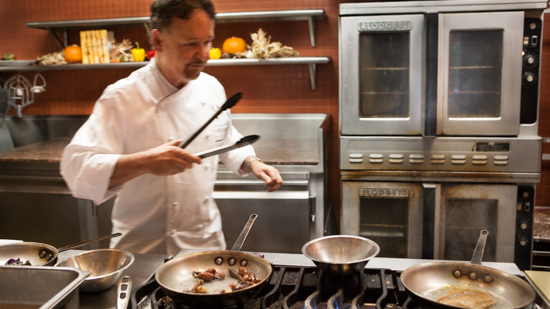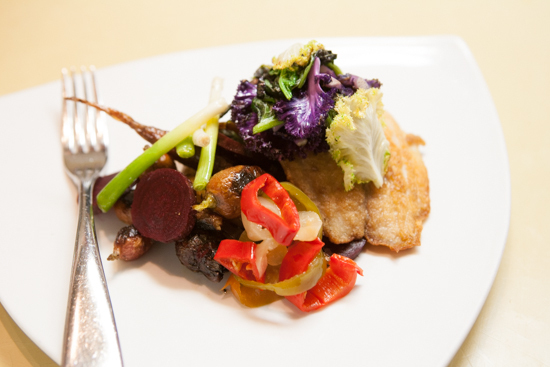Co-authored with Lee Glenn
An icy wind blew down the boulevards of Dallas. Stephan Pyles' restaurant was only two short blocks from my hotel, but each slippery step was a skid closer to the godfather of southwestern cuisine.
At 10:00 a.m. the doors were locked. It was freezing. I peered through the glass, the room was dark, no one to be seen. I was ready to retrace my frozen steps when Stephan appeared from the back. Obviously not deterred by the numbing weather, he unlocked the door and welcomed me in.
Stephan knew the weather would kill the lunch crowd. He muttered, "It's too bitter cold out there, we're closing for lunch."
A great interview under these circumstances didn't seem promising, but Stephan, a consummate host, made a cappuccino to defrost my hands and warm me. We sat in the private dining room, complete with handsome demonstration kitchen, to forage through his trailblazing culinary history.
A fifth-generation Texan, Stephan was trained in classical voice and piano, but was diverted to apprentice at his family's truck stop kitchen. Ditching that training, he enrolled in culinary school. With limitless courage in the face of the unfamiliar, he recalls: "From Texas truck stop I was off to classic French training at The Great Chefs of France Cooking School at the Mondavi Winery."
"Classic French training is all about cooking with fresh seasonal foods. This was so new and foreign to me at the time. Seasonal wasn't a part of my truck stop vocabulary. Seasonality was opening a can."
Robert Mondavi seeded his school with Michelin chefs for inspiration. Famous guest instructors included Julia Child, Simon Beck, Paul Bocuse and Michel Guerard. Alice Waters sent her personal forager to secure specialty produce like wild mushrooms and young lettuces. The students once had to find two pints of blood for an Alain Chapel sauce. They found a farmer in Napa who slaughtered half dozen chickens for their mission.
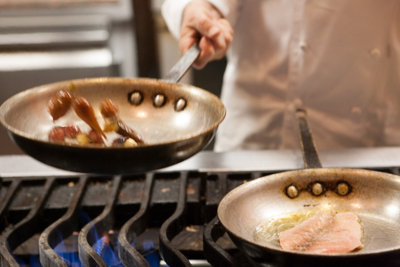 For Stephan, a new food frontier was on the horizon. As a Texas native, he wanted to feature ingredients and dishes from his part of the world. With limitless courage, he opened his first restaurant based on a fresh foods interpretation of indigenous Texas recipes. Fresh local produce though, was a challenge.
For Stephan, a new food frontier was on the horizon. As a Texas native, he wanted to feature ingredients and dishes from his part of the world. With limitless courage, he opened his first restaurant based on a fresh foods interpretation of indigenous Texas recipes. Fresh local produce though, was a challenge.
"Back then, there was very little to choose from locally. There was no communication with local farmers. Farmers didn't diversify. Growing multiple crops like basil, thyme, and red peppers wasn't seen as economically viable."
For example, Stephan sought color diversity in his bell peppers: "I'd tell them, leave the peppers a little longer before picking to make them red. The farmers resisted saying why leave them an extra 20 days just to turn to red?"
With limitless resourcefulness, he flew in yellow and red bell peppers from southern California.
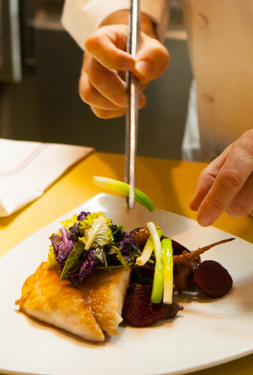 "Local sourcing needed to be a movement and that takes a lot of people. There's power in numbers," he adds explaining his role in co-founding the Chefs Collaborative. "It was the birth of the farm-to-table movement by getting farmers involved... to connect without the middleman."
"Local sourcing needed to be a movement and that takes a lot of people. There's power in numbers," he adds explaining his role in co-founding the Chefs Collaborative. "It was the birth of the farm-to-table movement by getting farmers involved... to connect without the middleman."
Today the Chefs Collaborative epitomizes passionate communication between chef and farmer, rancher, forager and fisher. Through its chef members, the Collaborative has developed local farm systems across the nation to produce fresh, local ingredients for restaurants. The chef-based demand for heirloom nutrient dense foods is helping to re-establish forgotten produce and proteins devalued by the industrial food system, creating limitless possibilities.
Amongst other things, the Chefs Collaborative initiates Trash Fish dinners. Despite the lack of a lunch crowd, Stephen said he was going to cook me a trash fish dish to photograph. I had heard of trash fish but was clearly taken back by the name. Stephan explained: "Fish not typically meant to be caught but that are great tasting. Peekytoe crab, the darling of all crabs, is a perfect example."
... limitless variety.
The catch and demonstration dish of the day: Sheepshead Fish with Purple Kale and Baby Root Vegetables.
Another important goal of the Chefs Collaborative is to strengthen local food economies. That plays itself out in sourcing local ingredients for all of Stephan's 15 restaurants. Some of his favorites:
•The Mozzarella Company
•Lotte Dairy for goat milk
•Rocky Tassione Organic farm for root veggies and baby green mustard
•Barking Cat for relish and red peppers
•Arrowhead for organically raised beef, pork, and chicken
•Vital Farms, for chicken
•Windy Hills for goat meat
•Tear Drop Farms for tomatoes
•Homestead Gristmill
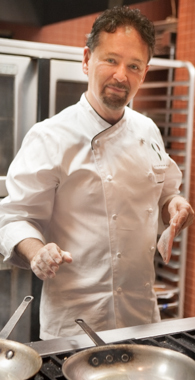 Dallas is a tight-knit cooking community with networking for dependable, local, eco-friendly sources. However, even the most conscientious chefs don't have the time to learn what is new on scene. Stephan is frustrated when the chefs at his restaurants do not diligently expand their local sources, though they spend hours researching while menu planning for seasonal changes. He hopes for a better solution such as the FoodShed Exchange, to provide efficient reliable connectivity.
Dallas is a tight-knit cooking community with networking for dependable, local, eco-friendly sources. However, even the most conscientious chefs don't have the time to learn what is new on scene. Stephan is frustrated when the chefs at his restaurants do not diligently expand their local sources, though they spend hours researching while menu planning for seasonal changes. He hopes for a better solution such as the FoodShed Exchange, to provide efficient reliable connectivity.
Limitless for Stephan is the value of involvement and outreach in his community. He is a founding board member of Share Our Strength who sponsor No Kid Hungry program, America's largest hunger relief organization. He also serves is a Life Board of The North Texas Food Bank and co-founded their perishable food program, The Hunger Link. The Hunger Link provides surplus food from Dallas restaurants and hotels to shelters and meal programs.
Chef Stephan Pyles of Dallas refuses to be limited by boundaries on any level. His focused energy in the kitchen and for his community, demonstrates the power of food to connect people across cultures, generations and demographics... and to create limitless opportunities.
Photography by Julie Ann Fineman

